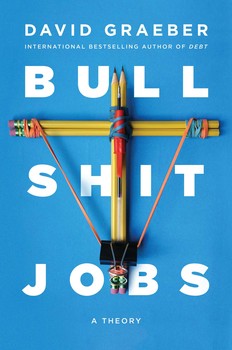Related Research Articles
Capitalism is an economic system based on the private ownership of the means of production and their operation for profit. Central characteristics of capitalism include capital accumulation, competitive markets, price systems, private property, property rights recognition, voluntary exchange, and wage labor. In a market economy, decision-making and investments are determined by owners of wealth, property, or ability to maneuver capital or production ability in capital and financial markets—whereas prices and the distribution of goods and services are mainly determined by competition in goods and services markets.

Labour economics, or labor economics, seeks to understand the functioning and dynamics of the markets for wage labour. Labour is a commodity that is supplied by labourers, usually in exchange for a wage paid by demanding firms. Because these labourers exist as parts of a social, institutional, or political system, labour economics must also account for social, cultural and political variables.

Wage slavery is a term used to criticize exploitation of labor by business, by keeping wages low or stagnant in order to maximize profits. The situation of wage slavery can be loosely defined as a person's dependence on wages for their livelihood, especially when wages are low, treatment and conditions are poor, and there are few chances of upward mobility.
Neoliberalism, also neo-liberalism, is a term used to signify the late-20th century political reappearance of 19th-century ideas associated with free-market capitalism. The term has multiple, competing definitions, and is often used pejoratively. In scholarly use, the term is frequently undefined or used to characterize a vast variety of phenomena, but is primarily used to describe the transformation of society due to market-based reforms.

Busy work is an activity that is undertaken to pass time and stay busy but in and of itself has little or no actual value. Busy work occurs in business, military and other settings, in situations where people may be required to be present but may lack the opportunities, skills or need to do something more productive. People may engage in busy work to maintain an appearance of activity, in order to avoid criticism of being inactive or idle.
Ordoliberalism is the German variant of economic liberalism that emphasizes the need for government to ensure that the free market produces results close to its theoretical potential but does not advocate for a welfare state.

David Rolfe Graeber was an American anthropologist and anarchist activist. His influential work in economic anthropology, particularly his books Debt: The First 5,000 Years (2011), Bullshit Jobs (2018), and The Dawn of Everything (2021), and his leading role in the Occupy movement, earned him recognition as one of the foremost anthropologists and left-wing thinkers of his time.

Wage labour, usually referred to as paid work, paid employment, or paid labour, refers to the socioeconomic relationship between a worker and an employer in which the worker sells their labour power under a formal or informal employment contract. These transactions usually occur in a labour market where wages or salaries are market-determined.

A strikebreaker is a person who works despite a strike. Strikebreakers are usually individuals who were not employed by the company before the trade union dispute but hired after or during the strike to keep the organization running. Strikebreakers may also refer to workers who cross picket lines to work.
Marxism is a political philosophy and method of socioeconomic analysis. It uses a materialist interpretation of historical development, better known as "historical materialism," to understand class relations and social conflict. It also uses a dialectical perspective to view social transformation. Marxism originates from the works of 19th-century German philosophers Karl Marx and Friedrich Engels. Marxism has developed over time into various branches and schools of thought, As a result, there is no single, definitive Marxist theory. Marxism has had a profound impact in shaping the modern world, with various left-wing and far-left political movements taking inspiration from it in varying local contexts.

Criticism of capitalism is a critique of political economy that involves the rejection of, or dissatisfaction with the economic system of capitalism and its outcomes. Criticisms typically range from expressing disagreement with particular aspects or outcomes of capitalism to rejecting the principles of the capitalist system in its entirety.
"From each according to his ability, to each according to his needs" is a slogan popularised by Karl Marx in his 1875 Critique of the Gotha Programme. The principle refers to free access to and distribution of goods, capital and services. In the Marxist view, such an arrangement will be made possible by the abundance of goods and services that a developed communist system will be capable to produce; the idea is that, with the full development of socialism and unfettered productive forces, there will be enough to satisfy everyone's needs.
A make-work job is a job that is created and maintained at a cost not offset by the job’s fulfilment. Usually having little or no immediate financial benefit such roles can be said to exist for other economic or social-political reasons, for example simply to provide work-experience or maintain a ceremonial function.

"Hebrew labor" and "conquest of labor" are two related terms and concepts. One of them refers to the ideal adopted by some Jews in Ottoman and Mandate Palestine during the late 19th and early 20th centuries and later embraced by Zionism to favour hiring Jewish rather than non-Jewish workers. Another one is the slogan for the Jews to embrace productive labor rather than being engaged only in trades and professions.
Social democracy is a political, social, and economic philosophy within socialism that supports political and economic democracy and supports a gradualist, reformist and democratic approach towards achieving socialism, usually under a social liberal framework. In practice, social democracy takes a form of socially managed welfare capitalism, achieved with partial public ownership, economic interventionism, and policies promoting social equality.

Inventing the Future: Postcapitalism and a World Without Work is a 2015 monograph by Nick Srnicek and Alex Williams, published by Verso Books.

Bullshit Jobs: A Theory is a 2018 book by anthropologist David Graeber that postulates the existence of meaningless jobs and analyzes their societal harm. He contends that over half of societal work is pointless and becomes psychologically destructive when paired with a work ethic that associates work with self-worth. Graeber describes five types of meaningless jobs, in which workers pretend their role is not as pointless or harmful as they know it to be: flunkies, goons, duct tapers, box tickers, and taskmasters. He argues that the association of labor with virtuous suffering is recent in human history and proposes unions and universal basic income as a potential solution.
David Graeber was an American anthropologist and social theorist. Unless otherwise noted, all works are authored solely by David Graeber.

Critique of work or critique of labour is the critique of, and/or wish to abolish, work as such, and to critique what the critics of works deem wage slavery.
Christopher J. Newfield is an American academician and writer. He is Director of Research at the Independent Social Research Foundation in London, and until 2020 was Distinguished Professor of English at the University of California, Santa Barbara. Newfield is the author of a number of books and many papers in the following areas of research: Critical University Studies, quantification studies, the intellectual and social effects of the humanities, contemporary U.S. cultural history, and the relation between humanities knowledge and artificial intelligence. His book The Great Mistake was welcomed as a "timely, persuasive" warning against the evolving trend of privatization that led to "anti-egalitarian policy choices" affecting public funding of higher education in the US.
References
- ↑ Fogh Jensen, Anders; Nørmark, Dennis (2021). Pseudowork: How we ended up being busy doing nothing. Copenhagen: Gyldendal.
- ↑ Graeber, David (2018). Bullshit Jobs. Simon & Schuster. p. 10. ISBN 978-1-5011-4331-1.
- 1 2 Heller, Nathan (2018-07-06). "The Bullshit-Job Boom". The New Yorker .
- ↑ Graeber, David (2018-05-06). "Are You in a BS Job? In Academe, You're Hardly Alone". The Chronicle of Higher Education .
- ↑ Kezar, Adrianna; DePaola, Tom; Scott, Daniel T. (2019). The Gig Academy: Mapping Labor in the Neoliberal University. Johns Hopkins University Press. pp. 69–70. ISBN 978-1-4214-3271-7 – via Google Books.
- ↑ Maiese, Michelle; Hanna, Robert (2019). The Mind-Body Politic. Springer. p. 146. ISBN 978-3-030-19546-5 – via Google Books.
- ↑ Delucchi, Michael; Dadzie, Richard B.; Dean, Erik; Pham, Xuan (2021-06-17). "What's that smell? Bullshit jobs in higher education". Review of Social Economy: 1–22. doi: 10.1080/00346764.2021.1940255 . ISSN 0034-6764. S2CID 237792077.
- ↑ Reichman, Henry (2019). The Future of Academic Freedom. Johns Hopkins University Press. p. 5. ISBN 978-1-4214-2859-8 – via Google Books.